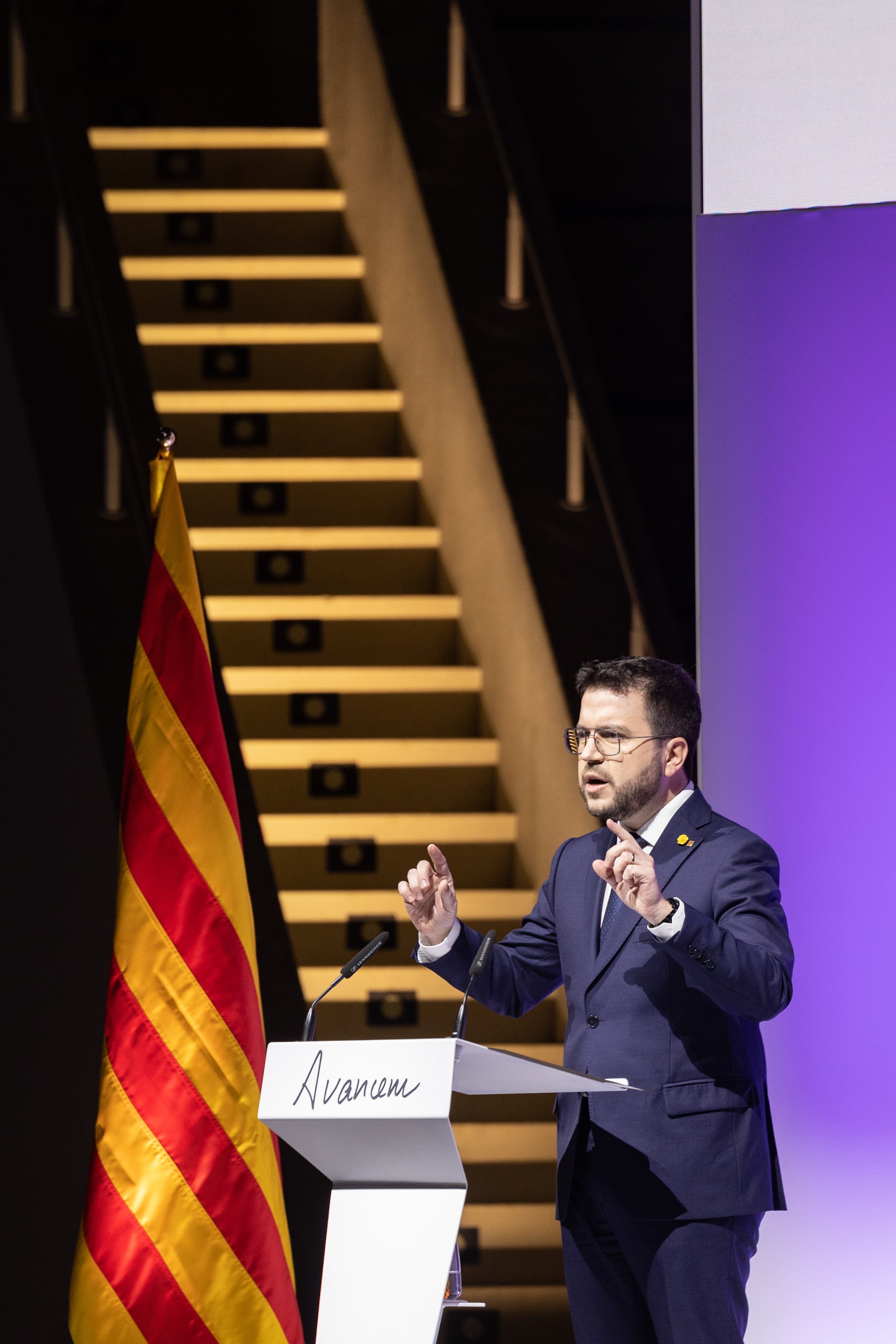Coinciding with the first anniversary of the last Catalan parliamentary elections, which returned a pro-independence majority, the president of Catalonia, Pere Aragonès, has this Monday night called to "reactivate" the strength of the independence movement, its "institutional strength and political mobilization," to oblige the Spanish state to "move." His address to assess the situation on this anniversary was delivered from the Oval Room of Catalonia's National Art Museum (MNAC), during which he proposed steps to the Spanish government that would allow progress to be made in the negotiation, starting with the ending of the cases against Catalan president Carles Puigdemont and the other exiled politicians, as demanded by the Council of Europe. Aragonès combined calls for unity and the avoidance of inter-party tacticism with warnings to the Spanish government, in particular asserting that if there is a PP and Vox executive in the next legislature, it will be due to "the lack of courage of the current Spanish government".
In the front row, the event was attended by members of the government, the speaker of parliament, Laura Borràs, and members of the parliamentary Bureau, and the leaders of the parliamentary parties who wanted to attend the event, to which all were invited except Vox. The CUP did not send any representatives, but as well as the full leadership team of Aragonès's own party ERC, starting with Oriol Junqueras, the front line of Junts were present, including the general secretary, Jordi Sànchez, and also attending were Catalan Socialist leader Salvador Illa and Jèssica Albiach of the Comuns. The major pro-independence organizations ANC and Òmnium were represented by Elisenda Paluzie and Marcel Mauri respectively. There were also representatives from the economic and social world.
Aragonès admitted that the process of negotiation with the Spanish state is experiencing difficulties "due to the lack of courage of the Spanish government", which refuses to make a political proposal and is delaying the calling of dialogue table meetings "due to party interests". Faced with this situation, he warned that the reactivation of the independence movement must force the state to move as the pardons for the political prisoners had showed, said Aragonès, adding that those pardons were "not the solution" but have been "an important step" because they acknowledge that the Supreme Court's judgment was unjust. As he has done on other occasions, Aragonès referred to the experience of Scotland, which reached agreement with the British government on a referendum in 2012, and Quebec, where a law of clarity was passed, to establish the rules of engagement on the independence issue.
Cannot stand idly by
"If the negotiations do not move forward, if they do not begin to show results, it is clear that we cannot stand idly by," he warned, although he did not specify what the response would be to failure of the dialogue table. However, he repeatedly called on the independence movement to show its strength, cohesion and unity of action, a process he described as "setting in motion the basis for the new modern Catalanism". He noted certain conditions which this process requires, the first being to "strengthen and visualize" the major consensuses of Catalan society, as a nation, a land that welcomes people, with Catalan as a common language. To this end he announced that he will launch a dialogue with all of the country's institutions and the main political, economic and social actors, starting with the parliamentarians in Catalonia and Madrid and the MEPs.
Aragonès referred to the need to govern well, to commit to economic and social progress, with popular mobilization in defence of the major social consensuses and civil and political rights, the amnesty and the right to self-determination. He spoke of the need to re-visualize these consensuses at the polls, to internationalize the process, and to "repair the unity of action of the independence movement."
"Let's stop competing to see who is more pro-independence or more left-wing. No one is more pro-independence than anyone else. Not those of us who worked for independence on our own for decades, nor those who have become pro-independence today," he warned, asserting the role of ERC and insisting that "there is no single way to be pro-independence."
The president opened his speech, which according to the government he has been preparing for weeks, assuring that it was directed at what he described as "the whole of Catalonia", which "includes everyone, whoever they are, no matter where they come from", without first or second-class citizens. The conference began at 7:30pm in the Oval Room, with the word Avancem - "Let's move forward" - emblazoned upon the cyclorama. As the president incorporated themes, different words were projected: nation, transformation, Catalan... The last two words to appear were independence and freedom.
In the aftermath of the elections in Castilla y León, which once again have showed the strength of the far right, Aragonès warned the Spanish state that "without the resolution of the political conflict between Catalonia and Spain, the latter will slide towards authoritarianism." If the state does not understand this, the Catalan president warned, "it will be opening the door to the right and the far right." And if that happens, said Aragonès, "the full and exclusive responsibility will be held by those who have governed with a focus on not upsetting the right, rather than on facing the conflict."

